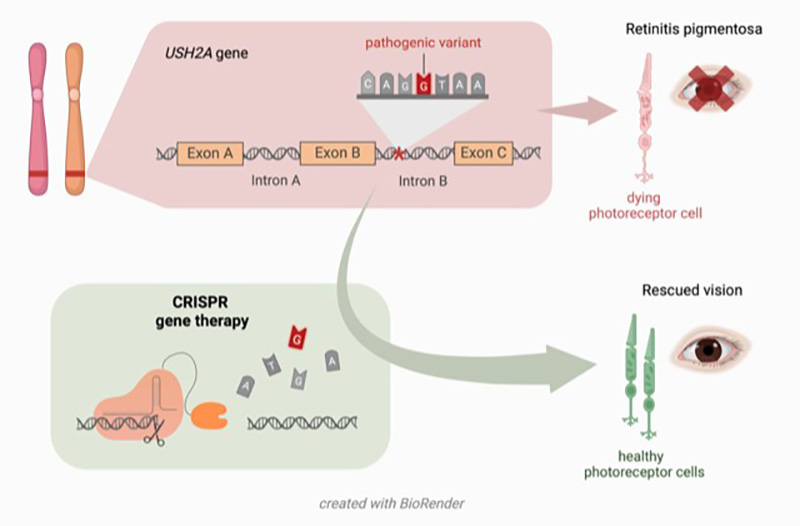Inducible CRISPR gene editing systems for pathogenic USH2A variants
Salome Spaag — Hector Fellow Eberhart Zrenner
Amongst the leading causes of retinal dystrophies worldwide is Retinitis pigmentosa, a severe disease often caused by splice variants in the USH2A gene. This project aims to develop a safe CRISPR-based therapeutic strategy for correction of such splicing defects. Using enhanced-deletion nucleases, the disease-causing alterations can be eliminated, hereby restoring correct protein synthesis. The focus lies on safety features as well as the development of an inducible viral delivery system for clinical application.
Retinitis pigmentosa (RP) is one of the leading forms of inherited retinal dystrophies, causing progressive vision loss in 1.5 million individuals worldwide. Mutations in the USH2A gene are amongst the most frequent genetic bases for this disease and can moreover cause Usher syndrome, a combination of Retinitis pigmentosa with hearing loss. Around 10% of these pathogenic genetic variants are splicing mutations which disrupt mRNA maturation, resulting in non-functional USH2A protein.
The PhD project aims for the preclinical development of a safe therapeutic strategy for splicing restoration in USH2A. This is to be achieved using novel enhanced-deletion CRISPR — endonuclease systems. These nucleases can be programmed to eliminate the disease-causing intronic DNA sequence, leading to correctly spliced mRNA and functional protein in the target cells. The focus of the project lies firstly on improving and demonstrating the safety of the systems compared to conventional CRISPR approaches in different human cellular models. Furthermore, as this is translational research, aimed at eventually benefiting patients directly, it will also strongly concentrate on developing a suitable delivery system for clinical use. Specifically, an effective and inducible delivery system based on adeno-associated viruses shall be developed to make it applicable to patient’s eyes.
Idea of the project: Development of a CRISPR-based gene therapy strategy for treatment of USH2A-associated vision loss

Salome Spaag
Eberhard Karls Universität TübingenSupervised by

Eberhart Zrenner
Medicine, Biology & Engineering

